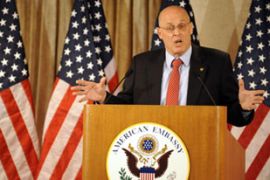G7 ministers discuss economic woes
US treasury secretary dismisses talk of recession as “Group of Seven” meets.

Published On 9 Feb 2008
“In all our economies, to varying degrees, growth is expected to slow somewhat in the short-term, reflecting wider global economic and financial developments,” The G7 said in a statement.
But Henry Paulson, the US treasury secretary, insisted that the US economy, the world’s largest, was generally healthy despite the subprime loans crisis.
Paulson said he was “confident” the US economy would continue to grow in 2008 and rejected talk of a recession.
“I believe that we are going to keep growing. If you are growing, you are not in recession, right? We all know that,” Paulson said after the meeting.
But he added that “the housing correction, high energy prices and capital market turmoil have combined to weigh on near-term growth”.
Credit crunch
Financial regulators delivered a grim assessment of the credit market upheaval on Saturday, warning that worse may lie ahead as banks lend less money.
|
“I believe that we are going to keep growing. If you are growing, you are not in recession, right? We all know that” Henry Paulson, |
While there has been an easing of conditions in money markets, there are growing concerns about falling share prices and the health of financial institutions, experts from the Financial Stability Forum said.
“There remains a risk that further shocks may lead to a recurrence of the acute liquidity pressures experienced last year. It is likely that we face a prolonged adjustment, which could be difficult,” they said in their interim report to the G7 ministers.
In an interview earlier with Japan’s Nikkei daily, Paulson said banks should take losses and raise capital quickly to alleviate a credit crunch.
“The worst thing is if they don’t raise capital, if they shrink their balance sheet and then restrain their lending,” he said.
Cash injection
But pledges by G7 members to work together contrast with divisions between the countries over fiscal policy.
In January, many in Europe privately expressed concern over the US Federal Reserve’s aggressive interest rate-cutting stance, when it slashed 1.25 percentage points off of the federal funds rate in less than 10 days.
On Thursday, the US congress passed a major stimulus package aimed at reviving the economy.
Washington’s calls for other major economies to take similar action have met resistance.
“The actions that the US Federal Reserve and president [George] Bush have taken are appropriate to the US,” Alistair Darling, the UK’s finance minister, said in Tokyo.
“Other countries are not in that position and will take appropriate action for their own economies.”
No ‘single fix’
One analyst told Al Jazeera that there was no “single fix” that was applicable to every economy.
“There’s no such thing as a single fix today, simply because the conditions on the ground for the different economic regions in the world are very different,” Yuwa Hendrick-Wong, an economic adviser to Mastercard Worldwide, said.
“Different authorities will have to take different types of action.”
The G7 meeting also focused on currency issues, including the Chinese yuan.
As in previous meetings, the group called on Beijing to allow its currency to appreciate more quickly.
Many G7 leaders think the weak yuan gives China an unfair trade advantage and have called on Beijing to step up domestic investment to help rebalance the world economy.
Source: Al Jazeera, News Agencies